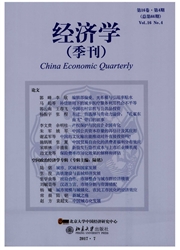

 中文摘要:
中文摘要:
本文应用中国省际面板数据对FDI与国内资本的关系进行了实证研究。结果发现:FDI对国内资本存在挤入效应,产生这种效应的原因与FDI主要以“绿地投资”的方式进入并主要分布于中国实力较强的制造业有关,也与中国市场整体竞争程度较高有关;由于政府“偏向性的”政策和私人资本“发育滞后”,FDI对国有资本的挤入作用大于对私人资本的作用;在FDI对国内资本的挤入效应中,金融支持具有“协进”的作用,即金融支持越强,挤入效应越大。
 英文摘要:
英文摘要:
This paper uses provincial panel data to investigate the relationship between FDI and domestic capital in China. The results show that FDI has "crowding-in" effects on domestic capital. The crowding-in effects that FDI has on state-owned capital are larger than on private capital. The stronger are the financial supports, the larger are the crowding-in effects. That FDI produces positive impacts on domestic capital accumulation is related to its model of entry in the form of "green field investment" as well as the high degree of competition in Chinese industries. As for the different effects on different types of domestic capital, there is no doubt that discriminating policies of the government have played a major role.
 同期刊论文项目
同期刊论文项目
 同项目期刊论文
同项目期刊论文
 期刊信息
期刊信息
